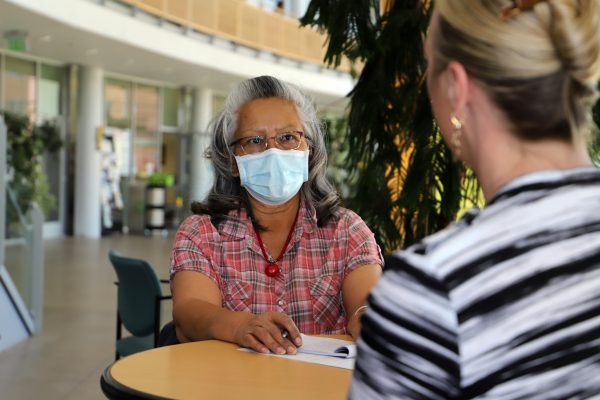
When a group of collaborators wanted to eliminate early childhood caries on the Crow and Hopi reservations in Montana and Arizona, respectively, they began by bringing together all of the people most important to changing oral health outcomes in children—community leaders, local dentists, hygienists, nurses, community health representatives and caregivers.
Through a community-engaged research program called “Great Beginnings for Healthy Native Smiles,” partners from the Hopi Department of Health and Human Services in Arizona, Little Big Horn College in Montana, and researchers from Northern Arizona University began a five-year study to combat oral health inequities among American Indian and Alaska Native populations.
The partners recently released a publication about the study in the Journal of Public Health Dentistry, “Community Based Participatory Research Approaches to Combat Oral Health Inequities Among American Indian and Alaska Native Populations” which discusses the keys to empowering caregivers and successfully changing the course of early childhood caries.
In their study, they use a multipronged approach to improving childhood oral health that includes: incorporating culturally centered strategies; employing community members to develop and implement the program; using motivational interviewing with caregivers; and consistently encouraging caregivers to add a fluoride varnish treatment to their children’s oral health regimen.
They also created a community advisory board in each community to guide their work and culturally align their materials, and they hired community health representatives and health educators to work directly with caregivers in the study.
Lead author Carolyn Camplain, senior research coordinator for the Center for Health Equity Research (CHER), said that throughout the study, they learned that community-based work and partnering with the communities throughout the program leads to more powerful and meaningful research, despite the challenges of the COVID-19 pandemic that interrupted their work.
“This work focuses on the importance of developing trusting partnerships with the communities we work with and for,” Camplain said. “By creating a community advisory board comprised of community members with lived experiences and having a deep and understanding partnership with the community, we gain a more holistic understanding to develop interventions and intervention materials that are more relevant and useful.”
Other researchers include Christine Kirby, CHER senior research coordinator; Steven D Barger, professor, NAU Department of Psychological Sciences; Heather Thomas, assistant clinical professor, NAU Department of Dental Hygiene; Marissa Tutt, CHER research coordinator; Kristan Elwell, assistant clinical professor, NAU Department of Health Sciences; consultant Sara Young, Crow tribal member; Gerlinda Morrison, site coordinator, Little Big Horn College, Crow Agency, Montana; Stephanie Hyeoma, community health representative, Hopi Department of Health and Human Services, Arizona; and Regents’ Professor Julie A Baldwin, CHER director. Skyler Bordeaux, CHER research coordinator, is now a research team member.
Assessing early childhood caries in American Indian children
Previous research has found that 62% of American Indian and Alaska Native children younger than 6 years old have caries, which can lead to poor eating and sleeping, poor nutrition and impaired physical development.
In addition to behaviors and biology impacting oral health, the researchers found that social determinants of health—the conditions where people live, grow and work, and the systems and political and economic forces that shape individual health outcomes—are a key component to changing early childhood caries outcomes.
Some social determinants of health that lead to poor oral health that they found include:
- Lack of clean water.
- Lack of healthy foods.
- Far distance to providers.
- Lack of transportation.
- Fear of dentists.
- High cost of oral health care.
Creating the early childhood caries prevention program
The team first conducted a formative assessment and interviewed dentists, hygienists, nurses, mothers and caregivers. They developed culturally relevant materials from the assessment and hired a local community artist. The community health representatives and the community advisory board reviewed all of their materials.
Their culturally relevant materials included information about how a mother’s oral health affects her children, what leads to bacterial infection, the importance of healthy eating, how to brush children’s teeth and gums, why it is important to take children to the dentist, and why it is important to use a fluoride rinse.
The community health representatives were trained to use motivational interviewing—a technique that increases a person’s motivation to change—along with the materials and information needed to assist parents in improving their children’s oral health.
The study was designed to test whether combining all their approaches—honoring the communities they serve by incorporating Indigenous knowledge systems, using motivational interviewing during community health representative visits, applying fluoride varnish to children’s teeth, and focusing on the mother’s oral health during pregnancy—would lead to ideal oral health.
“Unfortunately, due to COVID-19 and challenges we had recruiting for the clinical trial, we had to pivot and change the scope of the study,” Baldwin said. “Now, we are focusing more on the impact of COVID-19 on oral health care utilization for moms and children and taking a deeper look at it and how motivational interviewing works and/or may need to be adapted for our moms. However, our long-term goal is to eventually return to the clinical trial to determine how effective our “bundled intervention” approach will be in reducing early childhood caries among American Indian children.”
This study was funded by the National Institute of Dental and Craniofacial Research, Grant/Award Number: U01DE028508-01.